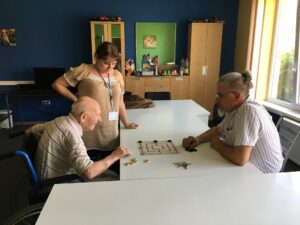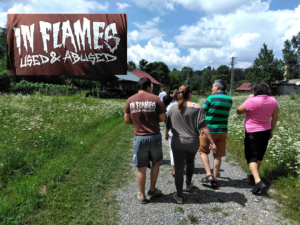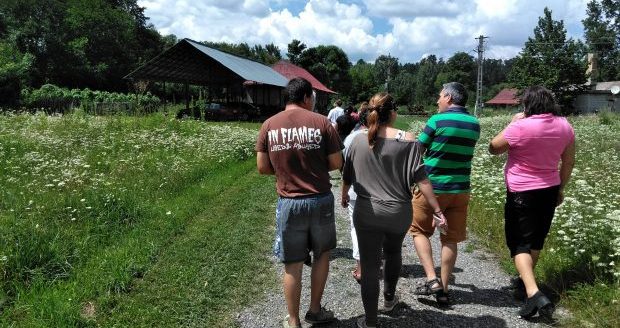M.S. in Counseling Student, Vincent T. reflects how his experience in Romania challenged his way of interacting with those around him.
 In St. John Paul’s writings, themes of personalism and integrity are intimately linked. For instance, Love and Responsibility provides us with a challenging definition of the human person: “the person is a good towards which the only proper and, adequate attitude is love.” If we consider the nature of love as essentially self-gift to our beloved (as the “object” of our love), then his definition provides us a lens by which all our actions may be filtered. When we internalize the notion that every human person, of whatever class or social status (rich/poor, able-bodied/disabled, this or that racial background, etc.) of whatever relationship (family, friend, “mere” acquaintance, business associate, exchanger-of-goods, passer-by, etc.), then we must approach that person with an attitude of love, an attitude of self-gift.
In St. John Paul’s writings, themes of personalism and integrity are intimately linked. For instance, Love and Responsibility provides us with a challenging definition of the human person: “the person is a good towards which the only proper and, adequate attitude is love.” If we consider the nature of love as essentially self-gift to our beloved (as the “object” of our love), then his definition provides us a lens by which all our actions may be filtered. When we internalize the notion that every human person, of whatever class or social status (rich/poor, able-bodied/disabled, this or that racial background, etc.) of whatever relationship (family, friend, “mere” acquaintance, business associate, exchanger-of-goods, passer-by, etc.), then we must approach that person with an attitude of love, an attitude of self-gift.
In the counseling courses I am taking at Divine Mercy University, they emphasize that one of the most important factors in counseling another human person is, what the literature calls, the “therapeutic alliance.” The relationship between the therapist and client is more important than the techniques used by the therapist or the cognitive framework under which therapy is conducted.
While recently in Romania, fellow classmates have articulated this notion of being with the client in this way: “I know that I cannot fix the client.” In the service economy in a world where we are habituated to view others as objects, we tend to see them as either recipients of goods or givers of goods. Entering a therapeutic relationship presents us with a challenge: If I’m not fixing my clients with my expertise, then what am I doing?
The idea of the therapeutic relationship calls counselors to be aware of their feelings and thoughts while interacting with the persons who present themselves for therapy. While research literature does not establish the metaphysical causes for the effectiveness of therapeutic alliance, it seems that St. John Paul’s definition of the human person provides insight into why the therapeutic alliance is so essential: Our clients are the sort of thing that our only adequate response to them is love. In loving another, we exchange the most miraculous of goods, the most sublime thing that we have to share, that part of us that can neither be bought nor sold: ourselves.
A day this week found two teams in Braca, a remote town in the mountains, where there is a population of male and female adults who have developments of MS that manifest as intellectual and physical disabilities. Born during the days of the infamous Romanian orphanages, these persons were cast away by their families first, then by society next. The location of the facility may be significant, as it is located about an hour away from the city of Oradea where the Smiles Foundation has several places of operation.
While Smiles has no formal relationship with this location, we visited the site to be present to the men and women there who are largely ignored by society and practice the therapeutic art of simply being with the other in a way that is meaningful to them. These human persons who suffer are still human persons, these goods towards which the only appropriate response is love greeted us with absolute joy. Even though they did not know or understand who we were, about 20 of them flocked around our bus with whoops and screams of pure delight. In some way, they knew we were coming to visit them, a rare event.
 But on the walk from where our bus stopped to the place where we would engage some of them in games and activities, a member of our team saw one of the men with a t-shirt that brought home the strange experience that we objectify even the most sacred of moments. In a country where the bulk of the population does not speak English at a location and where none of the residents could read, an intellectually challenged human person strolled along with us bearing a t-shirt that read, “In Flames: Used and Abused.”
But on the walk from where our bus stopped to the place where we would engage some of them in games and activities, a member of our team saw one of the men with a t-shirt that brought home the strange experience that we objectify even the most sacred of moments. In a country where the bulk of the population does not speak English at a location and where none of the residents could read, an intellectually challenged human person strolled along with us bearing a t-shirt that read, “In Flames: Used and Abused.”
In some ways, the slogan on the shirt was a proclamation much like the archetypal blind seer, Tiresias. The person who donated the shirt to the facility had no idea who would be wearing it at a later date. The child of Our Common Father had no idea what the shirt said, but the shirt spoke truth: From his earliest life in the harsh and abusive environment of being disposed in an orphanage to his removal to a remote part of the countryside, to be the recipient of a disposable t-shirt from a person who had not been used or abused – the witness of this man’s shirt spoke volumes. Rarely are we committed to making each act of ours towards another a true act of love whereby we honor and respect the other. Rarely do we seek encounters in which our actions are wholly ordered to giving of ourselves to recognize the dignity of their personhood and legitimate needs.
As a counselor-in-training, thinking about the dual process of what is happening is a needed skill. Introspectively, some of the questions that arose were: Are we demonstrating conscious love toward the men and women we encountered in Romania? Had we been objectifying anyone during the visits? How could we encounter differently so that the persons whom we met would not be objects upon which we practiced skills, but rather human persons who would be the recipients of self-gift freely given?

